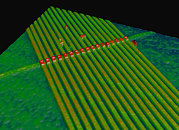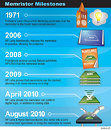Tuesday, August 31st 2010

HP Collaborates with Hynix to Bring the Memristor to Market in Next-generation Memory
HP today announced that it has entered into a joint development agreement with Hynix Semiconductor Inc., a world-leading memory supplier, to bring memristor, a new circuit element first intentionally demonstrated in HP Labs, to market in future memory products. Memristors require less energy to operate, are faster than present solid-state storage technologies and can retain information even when power is off. The memristor, short for "memory resistor," was postulated to be the fourth basic circuit element by Prof. Leon Chua of the University of California at Berkeley in 1971 and first intentionally reduced to practice by researchers in HP Labs, the company's central research arm, in 2006.
Earlier this year, HP announced the discovery that the memristor also can perform logic, showing that memristor-based devices could change the standard paradigm of computing by enabling computation to one day be performed in chips where data is stored, rather than on a specialized central processing unit.Bringing research to market
Joint development agreements are one way in which HP partners with others to leverage its intellectual property, which includes a portfolio of more than 30,000 patents. By collaborating with others to bring new technologies to market through intellectual property licenses and other technology transfer agreements, HP helps create new markets and generates a return on its research and development investment.Supporting quotes
"The memristor has storage capacity abilities many times greater than what competing technologies offer. By adopting HP's memristor technology we can deliver new, energy-efficient products to our customers more quickly," says Dr. S.W. Park, executive vice president and chief technology officer, Hynix.
"This agreement brings together HP's core intellectual property and a first-rate supplier with the capacity to bring this innovation to market in world-class memory on a mass scale. It is the most recent example of HP's ability to drive product innovation from the Labs out into the commercial world. This is discovery and invention with clear purpose, which differentiates HP and reinforces the value of our research enterprise to HP as a whole," says Stan Williams, senior fellow, HP, and founding director, Information and Quantum Systems Laboratory, HP Labs.
Highlights
Earlier this year, HP announced the discovery that the memristor also can perform logic, showing that memristor-based devices could change the standard paradigm of computing by enabling computation to one day be performed in chips where data is stored, rather than on a specialized central processing unit.Bringing research to market
Joint development agreements are one way in which HP partners with others to leverage its intellectual property, which includes a portfolio of more than 30,000 patents. By collaborating with others to bring new technologies to market through intellectual property licenses and other technology transfer agreements, HP helps create new markets and generates a return on its research and development investment.Supporting quotes
"The memristor has storage capacity abilities many times greater than what competing technologies offer. By adopting HP's memristor technology we can deliver new, energy-efficient products to our customers more quickly," says Dr. S.W. Park, executive vice president and chief technology officer, Hynix.
"This agreement brings together HP's core intellectual property and a first-rate supplier with the capacity to bring this innovation to market in world-class memory on a mass scale. It is the most recent example of HP's ability to drive product innovation from the Labs out into the commercial world. This is discovery and invention with clear purpose, which differentiates HP and reinforces the value of our research enterprise to HP as a whole," says Stan Williams, senior fellow, HP, and founding director, Information and Quantum Systems Laboratory, HP Labs.
Highlights
- The two companies will jointly develop new materials and process integration technology to transfer the memristor technology from research to commercial development in the form of Resistive Random Access Memory (ReRAM). Hynix will implement the memristor technology in its research and development fab.
- ReRAM is non-volatile memory with low power consumption that holds the potential to replace Flash memory currently used in mobile phones and MP3 players. It also has the potential to serve as a universal storage medium - that is, memory that can behave as Flash, DRAM or even a hard drive.


13 Comments on HP Collaborates with Hynix to Bring the Memristor to Market in Next-generation Memory
Edit: MSNBC is reporting that they want to have it to the public within three years. This looks very promising.Source
At least they won't be patent trolls.
And now they say it can perform logic operations. I just imagine how cpu, gpu, storage and ram will all die and it all could be replaced by one single chip which could do all the things we need.
memory market.IT sector.Memristors will basically make everything that we have atm obselete fairly quickly, provided that they're able to produce them in the first place at a similar size to the transistors used in CPUs.
If this sort of technology was fast then surely the planned application would apply to solidsate drives or newer ram/hybrid data storage for pc application.
as its suitable application is stated to be mobiles and mp3's and such, that I think really paints a clear picture for why there are no approximate speeds regarding this newer tech mentioned.
Imagine one day holding in your hand a monolithic core device that performs the functions of cpu/ram/hdd/gpu and more.. all possible because of the discovery of a 4th element:laugh:.
What's the difference between magic and really advanced tech in the mind of someone uninitiated? None at all
The future is just around the corner:cool:
The Monolith
It seems this might facilitate a return to systems operating on a more 'analog' fashion. Maybe it's a great candidate for memory storage but I hope it's got potential use as a scalar circuit element especially for real world modelling e.g. FPS:D
Barr